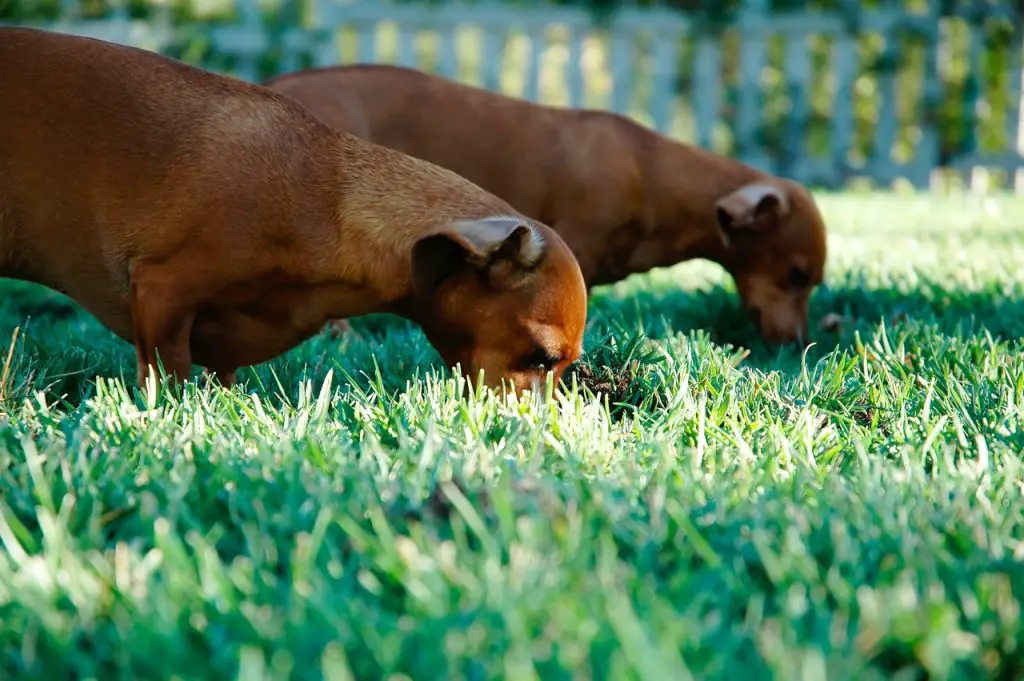If you’ve ever been worried about your dog eating grass or heard them making an odd stomach noise, you’re not alone. These are common questions that pet owners have about their canine companions’ digestion.
In this blog post, we will answer some of the most common questions about dogs and digestion.
We’ll cover everything from why dogs eat grass to what stomach gurgling means. Keep reading for more information on how to keep your pup’s digestive system healthy!
Key Takeaway
- Dog eating grass and experiencing stomach gurgling, scientifically known as borborygmi, can indicate an upset stomach or a normal part of digestion wherein food, water, and gas are moving through the gastrointestinal tract.
- For a dog with a gurgling stomach, you can offer smaller, more frequent meals, provide plenty of fresh water, utilize sensitive stomach diets, or if necessary, feed them a bland diet such as chicken and rice.
Why Is My Dog Eating Grass And Stomach Gurgling?

Many pet parents wonder why their dog is eating grass and has a gurgling stomach. Even if your dog is eating a totally balanced and nutritionally complete diet, that doesn’t mean that they might not crave something extra, like grass.
Here are the most common reasons why a dog is eating grass and has a gurgling stomach.
1. They need chlorophyll

Chlorophyll is a green pigment found in plants and algae. Its structure is a lot like your dog’s hemoglobin which is an important part of your dog’s red blood cells that carries oxygen throughout his body.
So, when your dog eats chlorophyll, he’s helping to replenish the red blood cells. Chlorophyll also helps your dog by protecting his cells from damage, in cancer-fighting, infections, healing, wounds, breaking down calcium oxalate stones in his bladder, and helping heal the digestive tract.
Chlorophyll can also be found in some algae and bacteria. It’s what gives plants their green color. Chlorophyll in dogs is thought to have many health benefits, including cancer prevention, detoxification, and wound healing.
Your dog can’t choose green veggies when he needs them, and the grass isn’t a great source of chlorophyll because it’s hard to digest. However, you can give your dog a healthy source of chlorophyll. You can mince or lightly steam vegetables like organic kale, broccoli, green beans, or parsley and feed them.
You need to mince or steam your dog’s veggies so he can better digest them. If it’s easier for you, you can add phytoplankton to your dog’s diet and you’ll also get healthy fats and trace minerals along with chlorophyll.
2. Digestive upset
Your dog could be eating grass and his stomach could gurgle if they have a digestive upset. Dogs can’t digest grass and often throw it back up. Dogs might sometimes eat grass to help toxins exit their stomach. They eat the grass knowing that they will throw it up together with the contents of their stomach.
If your dog is eating grass because he is not feeling well, you’ll often see other signs of sickness such as licking his lips, drooling, or just kind of punky looking. If that’s the case, a visit to the vet might be in order.
Make sure that your dog eats pesticide-free grass. Keep an eye on them to make sure they don’t start eating too much of it, as that could lead to vomiting and other digestive issues.
3. No underlying health issue, just pure fun
Eating is normal dog behavior. All wild dogs like wolves and coyotes do it. So, if your dog is getting enough greens in his diet and he’s looking like he’s feeling fine, he’s probably just in the mood for chewing and biting and grass satisfies the need to chew.
The act of eating grass simply feels good to dogs. They may just consider it fun to chew on. Grass has an interesting texture for them. Dogs with healthy appetites will maybe just be hungry and eat grass.
A word of caution is just to make sure the grass your dog eats isn’t sprayed with pesticides or chemicals. These are common causes of bladder cancer in your dog. So, you’ll want to make sure he only eats grass that’s free of chemicals.
Do Dogs Eat Grass When They Have An Upset Stomach?
Dogs eat grass for a variety of reasons including that they are experiencing gastrointestinal discomfort and hope that the grass will help to soothe their stomach. The gurgling noise is called borborygmi. This can be caused by gas or inflammation in the GI tract.
If your dog seems otherwise healthy and is eating and drinking normally, there’s no need to worry too much about occasional stomach gurgling. However, if the gurgling is accompanied by other symptoms like vomiting, diarrhea, or loss of appetite, it’s best to consult your veterinarian.
There are a few reasons why your dog may be eating grass and stomach gurgling. One reason could be that they are trying to soothe their digestive system. Another possibility is that they are lacking certain nutrients in their diet and are seeking them out by eating grass.
If your dog is displaying other abnormal behaviors or seems to be in pain, it’s best to consult with your veterinarian to rule out any health problems.
Although not scientifically proven, it is believed that grass can help with a dog’s digestion by acting as a natural laxative. Dogs are born with an instinct to eat grass, and puppies will often start nibbling on plants as early as three weeks old. The thing is that sometimes they do it for fun, and sometimes they eat grass because they have some issue with their stomach.
What Can I Give My Dog For a Gurgling Stomach?

There are many things you can give your dog for a gurgling stomach, but it is important to consult with your veterinarian first. Here is what you can give your dog for a gurgling stomach.
1. Probiotics
There are many benefits of probiotics for dogs. Probiotics can help improve your dog’s digestion and help with a gurgling stomach, immunity, and skin health. They can also help reduce stress and anxiety. Probiotics are safe for most dogs, but it’s important to talk to your vet before giving them to your dog.
Probiotics are live bacteria that are good for your dog’s digestive system. Dogs need a healthy balance of good and bad bacteria in their gut. Probiotics can help improve the balance of bacteria in your dog’s gut, which can lead to better overall health.
There are many different types of probiotics available for dogs. Some common strains include Lactobacillus acidophilus, Bifidobacterium animals, and Enterococcus faecium. Probiotics are available in a variety of forms, including powders, capsules, chews, and treats.
2. Enzymes
Enzymes are important for dogs because they help with digestion and help break down food so that the dog can absorb nutrients. Without enzymes, dogs would not be able to digest their food properly and would not get the nutrition they need. Enzymes are also important for maintaining a healthy coat and skin.
Dogs with healthy skin and coats have less of a chance of developing allergies or other health problems. There are many different types of enzymes that are beneficial for dogs, so it is important to ask your vet which ones are right for your dog. Giving your dog enzymes can make a big difference in their overall health!
If you’re interested in giving your dog enzymes, there are a few things you should keep in mind. First, enzymes are not a one-time thing – you’ll need to give them to your dog on a regular basis to see the benefits. Second, it’s important to choose the right type of enzyme for your dog.
3. Bland diets
Bland diets are usually prescribed for dogs who have gastrointestinal problems, such as gurgling stomach, vomiting, or diarrhea. The idea behind a bland diet is to give your dog’s digestive system a break while still providing the nutrients he needs.
There are a few things you should keep in mind if your dog is on a bland diet:
- Bland diets should only be used as a temporary measure. If your dog’s symptoms persist, please consult your veterinarian.
- Make sure to talk to your vet about what kind of food is best for your dog’s particular condition.
- When preparing a homemade bland diet, it is important to avoid adding any spices or seasonings that could further upset your dog’s stomach.
Is It Harmful For My Dog To Eat Grass?
Eating grass is generally not harmful to dogs and is considered a normal behavior, although it can sometimes lead to vomiting or ingestion of parasites.
Most veterinarians and experts consider grass eating a common behavior among dogs. It’s often seen as a natural reaction or instinct, possibly driven by a dog’s ancestral diet which included more plant material.
Dogs might also eat grass because they find it tasty or because it provides some roughage in their diet.
However, there are some potential risks associated with this behavior. Eating grass can cause some dogs to vomit, especially if they consume large amounts or if the grass is rough or sharp.
This is typically not a serious concern unless the vomiting is persistent or accompanied by other signs of illness says Dogster.
FAQs
Q: Can eating grass cause stomach gurgling in dogs?
A: Yes, eating grass can sometimes cause stomach gurgling in dogs. When dogs eat grass, it can lead to an increase in stomach acid production, which can result in a gurgling or rumbling sound. If the gurgling is accompanied by other symptoms such as vomiting or diarrhea, it is recommended to consult with a veterinarian.
Q: Should I be concerned if my dog’s stomach is gurgling?
A: In most cases, occasional stomach gurgling in dogs is normal and not a cause for concern. It is often a result of the digestion process and the movement of gas in the intestines. However, if the gurgling is persistent, accompanied by other symptoms such as vomiting or loss of appetite, it may indicate an underlying health issue and it is best to consult a veterinarian.
Q: What can I do to stop my dog from eating grass?
A: If you want to discourage your dog from eating grass, you can try providing them with alternative forms of mental and physical stimulation to alleviate boredom. Ensuring your dog’s diet is balanced and providing them with appropriate chew toys may also help reduce their urge to eat grass. Training and redirecting their focus onto other activities can also be effective.
Q: Are there any medical reasons why my dog is eating grass?
A: Yes, there are some medical reasons why dogs may eat grass. These can include dietary deficiencies, gastrointestinal upset, and conditions such as inflammatory bowel disease. If you are concerned about your dog’s grass eating behavior, it is recommended to consult with a veterinarian to rule out any underlying health issues.
Q: Is it normal for my dog to vomit after eating grass?
A: Occasional vomiting after eating grass is relatively common for dogs and is often not a cause for concern. The grass itself can sometimes irritate the dog’s stomach or induce vomiting as a means of self-cleansing. However, if your dog vomits consistently after eating grass or exhibits other symptoms such as loss of appetite or lethargy, it is advised to consult a veterinarian.
Q: Can I give my dog grass to eat?
A: While grass can provide some nutritional benefits to dogs, it is important to ensure that the grass your dog consumes is safe and free from pesticides or harmful chemicals. If you want to provide your dog with grass to eat, you can consider growing dog-friendly grass such as wheatgrass specifically for this purpose.
Q: What should I do if my dog is eating grass excessively?
A: If your dog is eating grass excessively and it is becoming a concern, it is recommended to consult with a veterinarian. Excessive grass eating can sometimes indicate an underlying health issue such as gastrointestinal upset or a dietary deficiency. A veterinarian can help determine the cause and provide appropriate guidance or treatment.
Q: How can I tell if my dog’s grass eating is concerning?
A: If your dog’s grass eating behavior is concerning, there are a few things to look out for. Excessive grass eating, accompanied by other symptoms such as vomiting, diarrhea, loss of appetite, or changes in behavior could indicate an underlying health issue. Additionally, if your dog is repeatedly eating grass that has been treated with pesticides or chemicals, it could pose a risk to their health.
Conclusion and final thoughts
In conclusion, dogs eating grass and experiencing stomach gurgling a common behaviors that may have various causes.
While it may not always be a cause for concern, it is important for pet owners to monitor their dog’s diet and overall health to ensure they are meeting their nutritional needs and identifying any potential underlying issues.




